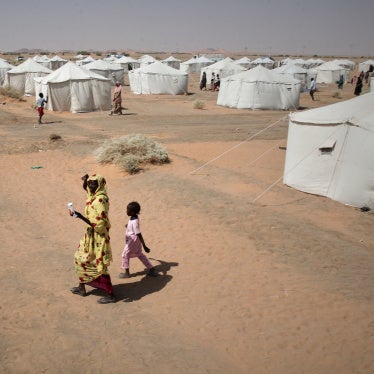The United Nations Human Rights Council took bold action to address the chronically poor human rights situations in Belarus and Eritrea, Human Rights Watch said today, at the closing of the council’s 20th session.
The council unanimously condemned the “widespread and systematic violations” in Eritrea and appointed a UN expert to investigate rights violations in the country. The council also appointed an expert to monitor the human rights situation in Belarus, in a vote of 22 to 5, with 20 abstentions.
“The Human Rights Council has finally condemned Eritrea for its appalling human rights record,” said Julie de Rivero, Geneva director at Human Rights Watch. “Now that the UN has appointed an expert to investigate and report on abuses, Eritrea can no longer use its political isolation to avoid international scrutiny.”
The Human Rights Council resolution on Eritrea condemned abuses including the detention of journalists, human rights defenders, political reformists and religious leaders; as well as forced conscription, enforced disappearances, torture, and severe restrictions on freedom of expression. It also denounced the government's “shoot to kill” policy to prevent Eritreans from escaping the country.
The country holds an estimated 5,000 to 10,000 political prisoners, and the resolution called on the government to release them. It also called on the government to end indefinite military service, torture, and arbitrary detention and the “guilt by association” policy that targets family members of those who evade national service or seek to flee Eritrea. Eritrea should give free and unhindered access to the UN expert to carry out the council’s mandate, Human Rights Watch said.
The council also took decisive action on the continuing crackdown against dissenting voices and civil society activists in Belarus since the December 2010 presidential election. The council appointed a UN expert to document and report back on violations in Belarus.
“The Human Rights Council sent a strong message that it stands by Belarusian activists and will scrutinize and speak out against Belarus' oppression of peaceful dissent,” de Rivero said. “It’s vital for the new expert to shed light on the root causes of rights violations in Belarus.”
More than a dozen opposition members and human rights activists are serving long prison sentences in Belarus as a result of politically motivated charges and unfair trials, Human Rights Watch said. These include Ales Bialitski, president of the Viasna Human Rights Center and vice-president of the Paris-based International Federation of Human Rights (FIDH). Dozens of others have been arbitrarily detained for short periods on bogus charges to harass or intimidate them, Human Rights Watch said. The Belarus government continues to restrict the right to freedom of association and prohibits many human rights activists from traveling in and out of the country.
At this session the council continued to receive reports of systemic, widespread, and grave human rights violations from the Commission of Inquiry on Syria. On July 2, 2012, at a closed-door briefing of the UN Security Council, the UN High Commissioner for Human Rights renewed her call on the Security Council to refer the situation in Syria to the International Criminal Court (ICC). At the Human Rights Council session, the Maldives delivered a cross-regional statement on behalf of 23 countries supporting the call of the high commissioner for an ICC referral.
The council strongly condemned abuses by the Syrian government and reiterated its stance that all violence in all forms by all parties must cease. It also reiterated “the importance of bringing to justice those responsible for the widespread and systematic use of violence against the Syrian people.” However, the resolution stopped short of recommending that the Security Council refer the situation in Syria to the ICC. The resolution was adopted by the council with 41 votes in favor and only Russia, China and Cuba voting against it.
The council also examined the situation in Mali, denouncing abuses since an elected government was pushed out of office in March and insurgent groups took over the northern part of the country. The council called for an end to all violations and acts of violence and asked the High Commissioner for Human Rights to brief it on developments in the northern Mali, at its next session, in September.
“The Human Rights Council should prepare itself to react promptly to any further grave deterioration of the human rights situation in Mali,” de Rivero said. “While the council’s request for the high commissioner to report on the situation in Mali in September is a good step, events may require the council to meet earlier to prevent further rights abuses.”
The council failed again to take any action on continuing violations in Bahrain. However, a joint declaration by 27 countries led by Switzerland on June 28 sent a clear message that the crackdown on largely peaceful protests and on human rights defenders was not acceptable, Human Rights Watch said. The United States, United Kingdom and South Korea did not join this collective call, but subsequently issued their own declarations on July 3 and 4 calling on Bahrain to end abuses and ensure accountability.
“The council’s decisions on Eritrea and Belarus at its 20th session bring much needed attention to abuses that would otherwise have been largely ignored,” de Rivero said. “In contrast, the council will fail to live up to its responsibilities if it continues its inaction in response to the rampant abuses in Bahrain over the past 15 months.”








